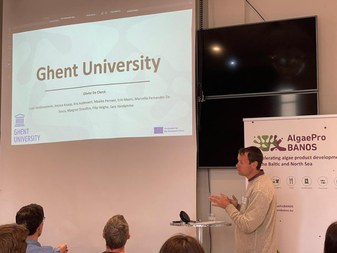Ghent University partners in a € 12 million EU-funded initiative to develop innovative algae products
(07-07-2023) AlgaeProBANOS: EU-funded project harnessing algae's unique properties for high-value products. 26 partners drive innovation in sustainable algae sector. Ghent University leads research on production, harvesting, and bioactivity.
The EU-funded project ‘AlgaeProBANOS’ will focus on leveraging the unique properties of algae to create new, high-value products and services for various applications including biostimulants. Algae are an incredibly versatile and sustainable resource that can be cultivated without using fresh water, arable land, or added fertilisers and pesticides. AlgaeProBANOS is a 4-year innovation project funded by the European Union’s Horizon Europe programme. It falls under the EU Mission Ocean, which aims to protect and restore the health of our oceans and waters through research and innovation.
Through this project, the consortium of 26 partners and affiliated entities (a mix of universities, research institutes, start-ups, SMEs and industry) will build acceleration networks and digital solutions to support algae businesses while running six business pilots across the Baltic and North Sea region, making use of both micro-and macroalgae for applications in food, feed, nutraceuticals, textiles, cosmetics and plant biostimulants. The project will bring eight innovative algae-based products to the market, helping to meet the growing demand for ecologically friendly, high-quality circular bio-based goods. To ensure the algae sector's social, environmental and economic sustainability and circularity, partners will develop a framework to work directly with consumers, raising awareness and ensuring that new products meet end-users demands and trends.
Ghent University is proud to be part of this ambitious consortium and project that will involve three research groups supported by three IRF Business Development Centres. Prof. Olivier De Clerck, head of the Phycology Research Group, is leading the work package dedicated to the sustainable production and harvesting of algae. Together with other partners, he will focus on strategies to optimize macroalgae growth and composition in the sea or recirculating aquaculture systems (RAS) for three commercially interesting macroalgae species: Furcellaria, Fucus and Saccharina. Cultivation strategies will be developed, such as vegetative reproduction, life cycle control, optimized RAS process conditions, identification of optimal locations for mariculture and seeding protocols. Also, post-harvest incubation of macroalgae biomass from wild stock and mariculture will be studied to increase the concentration of bioactive compounds, proteins, hydrocolloids and other metabolites. In parallel, the Department of Green Chemistry and Technology, under the lead of Prof. Erik Meers will work on improving the sustainability of microalgae production. More specifically, his group will investigate the use of digestate from anaerobic digestion, both on lab and pilot scale, as a sustainable nutrient source for microalgae growth, substituting artificial fertilisers. Autoflocculation (i.e., inducing the cells to self-aggregate and sink) will be investigated as a low-energy harvesting technique by adjusting the cultivation techniques. Finally, the Laboratory of Applied Mycology and Phenomics, under the lead of Prof. Kris Audenaert (CropFit) will perform bioactivity studies on macroalgae extracts to clarify the mode of action of macroalgae metabolites on plants, assess the efficiency of the extracts as a seed coating on different species and perform initial pot experiments to validate the biostimulant products. The UGent IRF consortia BLUEGent, CropFit and End-of-Waste will support the business development of the various macro-and microalgae applications through market studies and developing go-to-market strategies.
If you want to know more about the project, check out the project website (under construction), or subscribe to the newsletter.

